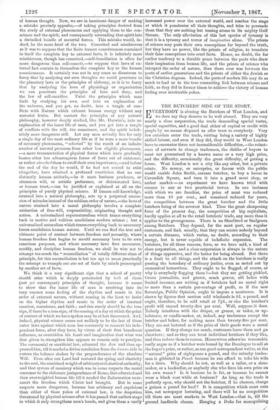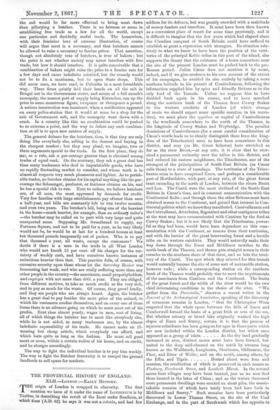THE BUTCHERS' SIDE OF THE STORY.
EVERYBODY is abusing the Butchers of West London, and we dare say they deserve to be well abused. They are very nearly a close corporation, the trade demanding special tastes, special capacities, and a good deal either of capital or credit with people by no means disposed to offer trust to everybody. Very few outsiders enter the trade, cutting being a variety of highly skilled labour, and even if they did, they would in West London have to encounter three not inconsiderable difficulties, —the reluct- ance of servants to change tradesmen, the dislike of buyers to meat not guaranteed by a known name or a very high price, and the difficulty, occasionally the great difficulty, of getting a house. West London is not a city like any other, but a private estate. No money, or enterprise, or favour with the public would enable John Smith, carcase butcher, to buy a house in Cavendish Square, and turn it into a grand meat shop, or rather market— an experiment we have known tried with success in one or two provincial towns. In one instance with which we are familiar, the price of meat was reduced more than 10 per cent., and remained reduced for years, the competition between the great butcher and the little butchers being of the severest kind. Thus the great cheapening force of the present day, the competition of big capitalists, hardly applies at all to the retail butchers' trade, any more than it applies to the greengrocers. There is no Shoolbred or Snelgrove among Butchers. They depend, for the most part, on regular customers, and find, usually, that they can secure nobody beyond a certain distance, which varies, no doubt, according to their energy, but is never capable of indefinite expansion. The butchers, for all these reasons, form, as we have said, a kind of close corporation, and a close corporation is always in the nature of things oppressive, and the better for being abused. But there is a limit to all things, and the attack on the butchers is really passing the boundary of ordinary justice, even as meted out by economical housewives. They ought to be flogged, of course, or why is everybody flogging them ?—but they are getting pickled. Grave journalists, and graver, much graver, old ladies with limited incomes, are writing as if butchers had no moral right to more than a certain per-centage of profit, as if the new Sovereign, Public Opinion, ought to impose a maximum. It is shown by figures that mutton sold wholesale is 6d. a pound, and ought, therefore, to be sold retail at 70., or else the butcher's profit will exceed twenty-five per cent. Well, suppose it does. Nobody interferes with the draper, or grocer, or tailor, or up- holsterer, or candle-maker, or, indeed, any tradesman except the butcher and baker, for making more than twenty-five per cent. They are not lectured as if the price of their goods were a moral question. If they charge too much, customers leave them and go elsewhere ; and so they can treat individual butchers if they like, and thus reduce them to reason. Housewives otherwise reasonable really argue as if a butcher were hound by the Decalogue to sell at the buyer's price, or rather, as one good correspondent writes, at the " natural " price of eightpence a pound, and the unlucky trades- man is gibbeted in Punch because he can afford to take his wife for a drive. Why should he not, as well as a tailor, or a shoe- maker, or a bookseller, or anybody else who fixes his own price on his own wares ? Is it because he is fat, or because he cannot wear a black coat while at business? As long as the trade is perfectly open, why should not the butcher, if he chooses, charge a guinea a pound for beef? It is competition which must cure him, not newspaper lecturing, and there will be no competition till there are meat markets in West London—that is, till the ground landlords choose. Hanging a Duke for monopolizing the soil would be far more effectual to bring meat down than pillorying a butcher. There is no fairness or sense in establishing free trade as a law for all the world, except one particular. and decidedly useful trade. The housewives, with their feminine love of extreme illustration, of courae will argue that meat is a necessary, and that butchers cannot be allowed to raise a necessary to famine prices. That assertion, though not absolutely true of butchers, is true of bakers ; but the point is not whether society may never interfere with free trade, but how it should interfere. It is quite conceivable that a combination of bakers might raise the price to a famine rate for a few days and cause indefinite mischief, but the remedy would not be to fix a maximum, but to open State shops. This did occur once, we have read, in Calcutta in a most formidable way. Three firms quietly laid their hands on all the salt in Bengal not in the Government stores, and secure of a full month's monopoly, the nearest port of supply being Kurraehee, ran up the price to some monstrous figure, twopence or threepence a pound. A serious insurrection was imminent, when a notification appeared on every police-station that it would at noon be a shop for the sale of Government salt, and the monopoly went down with a crash. In a country like this no combination could be pushed to so extreme a point, and the way to defeat any such combina- tion at all is to open new centres of supply.
The general defence for the butchers, then, is that they are only doing like everybody else, selling in the dearest and buying in the cheapest market ; but they may plead, we imagine, two or three arguments special to the trade. In the first place, they do slot, as a rule, ask a per-centage greater than is obtained among trades of equal rank. On the contrary, they ask a great deal less than many tradesmen who deal in imperishable goods, who have no rapidly fluctuating market to consider, and whose work is in almost all respects very much pleasanter and lighter. As to perish- able trades, no butcher obtains for his capital anything like the per- -centage the fishmonger, poulterer, or fruiterer obtains on his, and he has a special risk to run. Next to tailors, we believe butchers are, of all men, the most oppressed by demands for credit. -Very few families with large establishments pay oftener than once a half-year, and bills are constantly left to run twelve months, and even two years. The butcher's bill, being one of the heaviest in the house—much heavier, for example, than an ordina* tailor's —the butcher may be called on to part with very large and quite unexpected sums. Supposing Mr. Sweetbread to supply, say Portman Square, and not to be paid for a year, as he very likely would not be, he would be at last for a hundred houses at least ten thousand pounds temporarily out of pocket. Who is to pay that thousand a year, all waste, except the customers? We doubt if there is a man in the trade in all West London who would not knock 15 per cent. off his charges for the cer- tainty of weekly cash, and have ourselves known instances of reductions heavier than that. This practice falls, of course, with -excessive severity upon those whose lot the Saturday Review was bemoaning last week, and who are really suffering more than any other people in the country—the annuitants, small propertyholders, and employ1.9 with not more than 400/. a year. They are obliged, from different motives, to take as much credit as the very rich, and to pay as much for the waste. Of course, they growl loudly, and they are people who are always heard. Again, the butcher has a great deal to pay besides the mere price of the animal, to -which his customers confine themselves, and on every one of these items there is an advance going on which he must meet out of his profits. Rent rises almost yearly, wages to men, cost of living, -all of which things the butcher has to meet like everybody else, while he is not aided, as many tradesmen are, by the almost indefinite expansibility of his trade. He cannot make an ill- wearing but cheap article, which everybody can afford, and which lasts quite as long as the fashion. He must sell good -meat or none, within a certain radius of his house, and on credit, .and he charges accordingly.
The way to fight the individual butcher is to pay him weekly. The way to fight the Butcher fraternity is to compel the ground landlords to sell space for markets.































 Previous page
Previous page